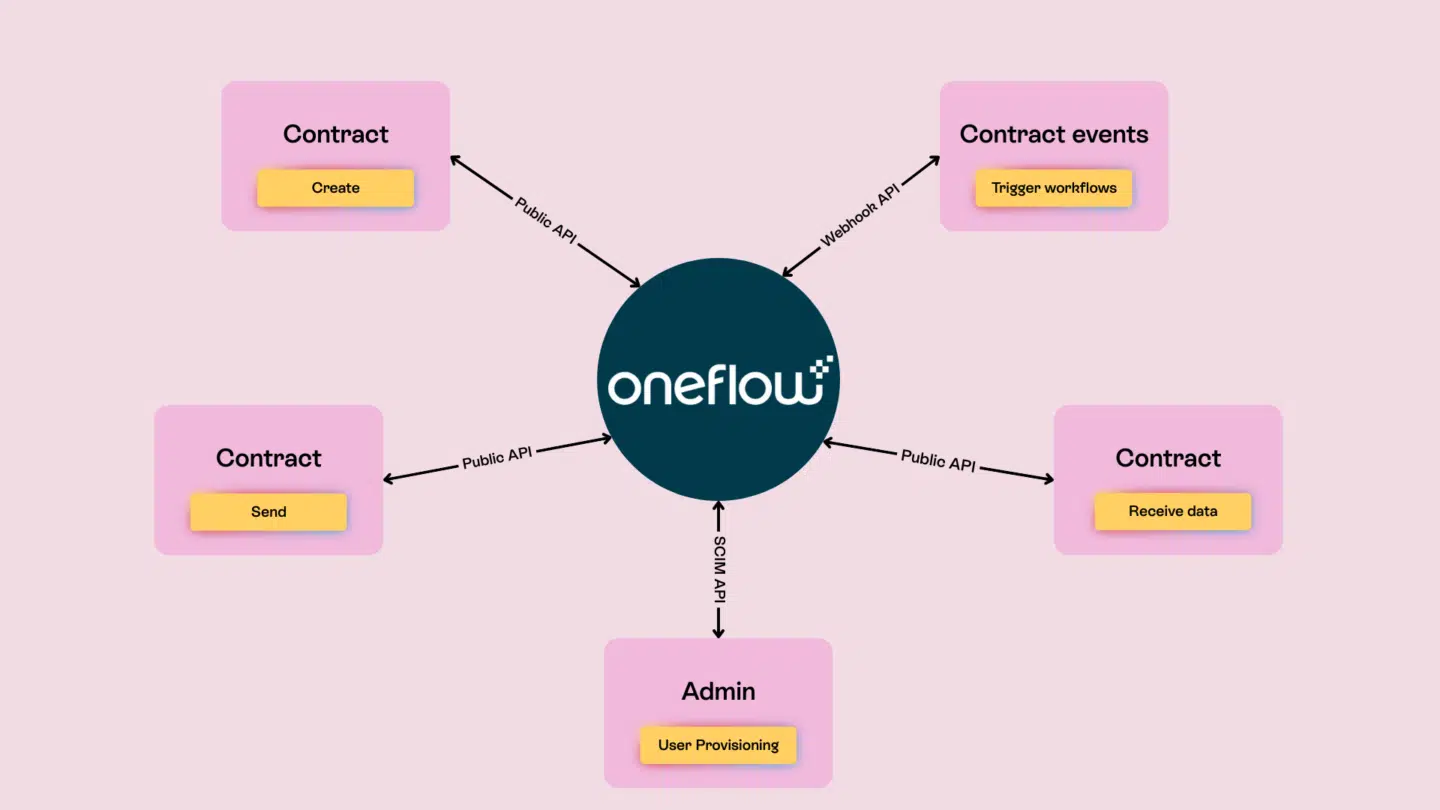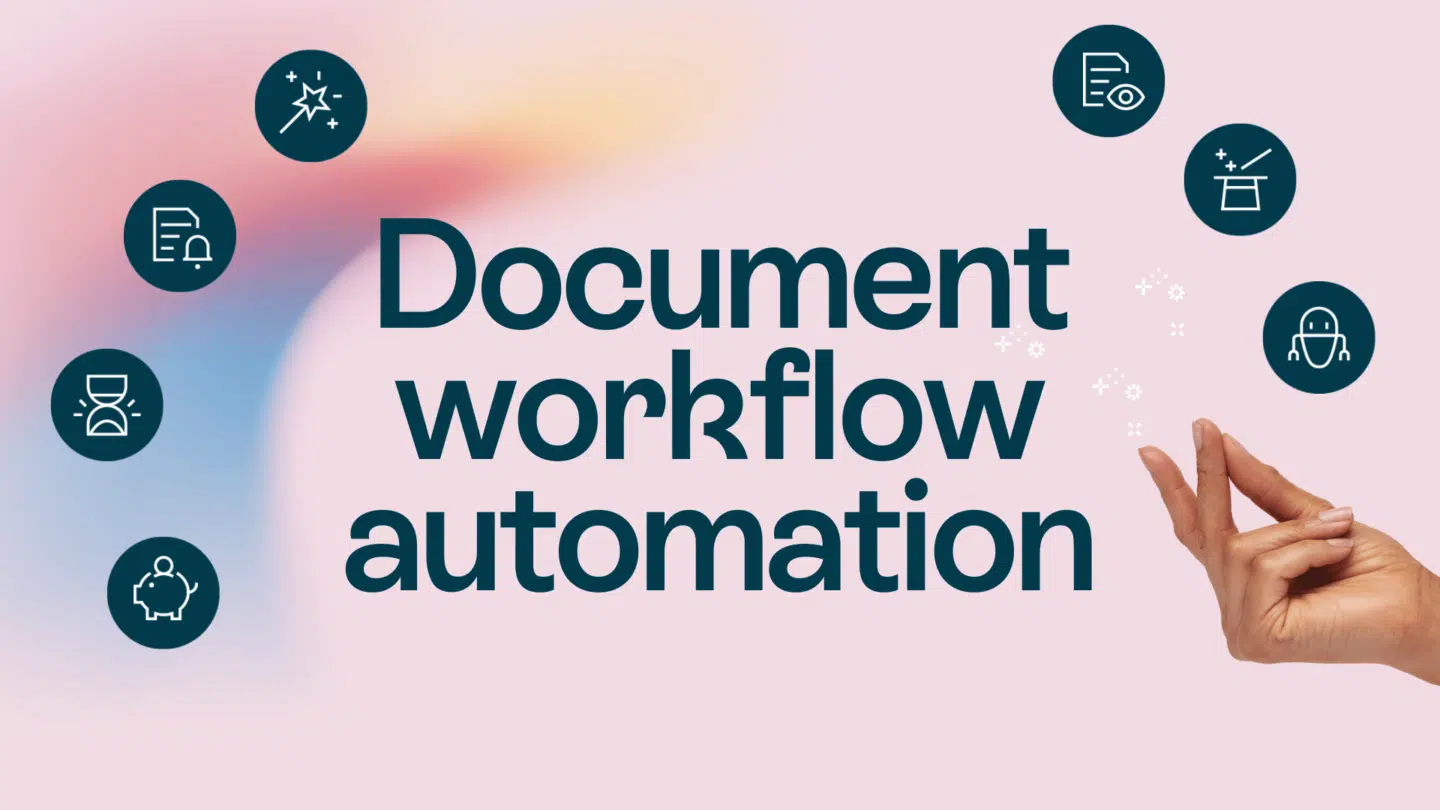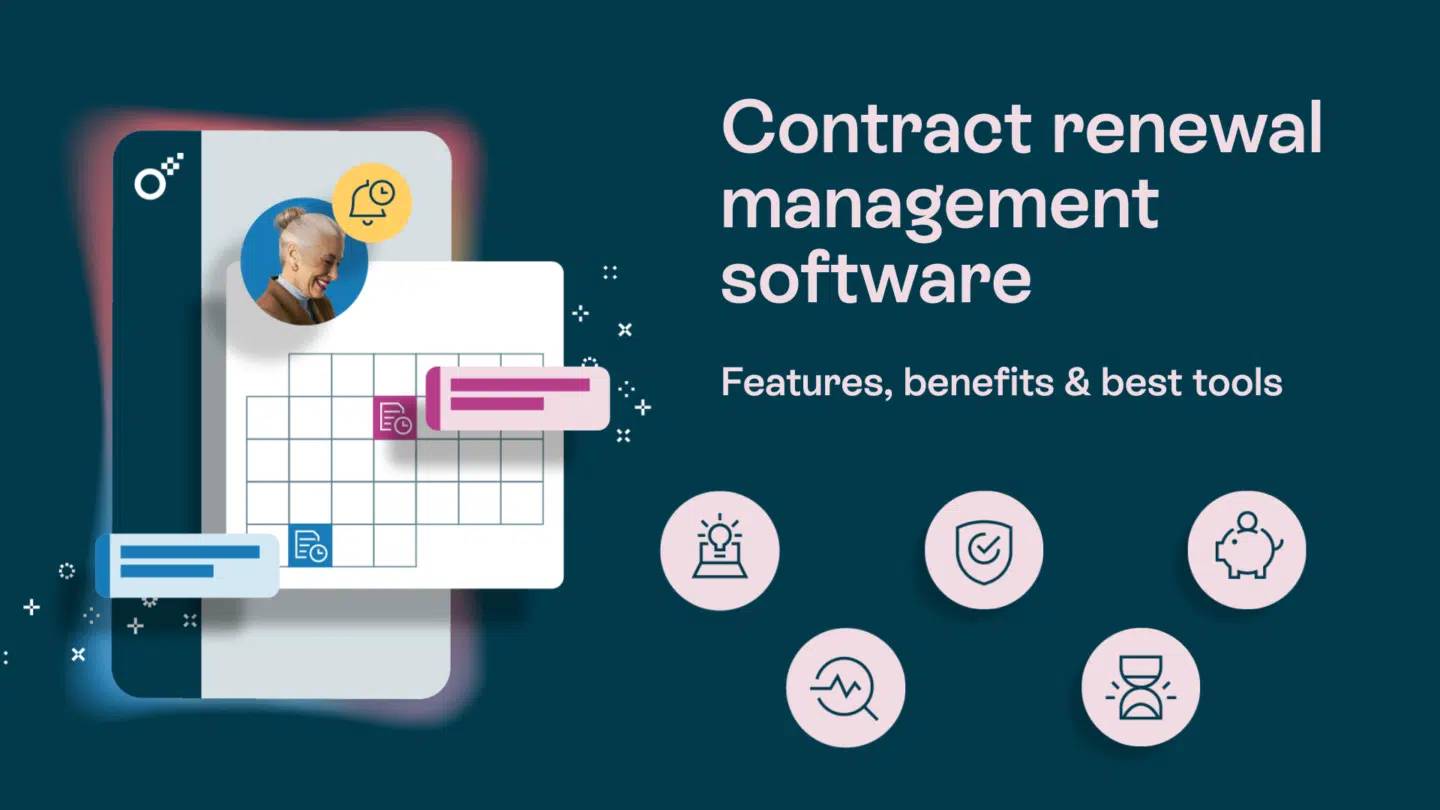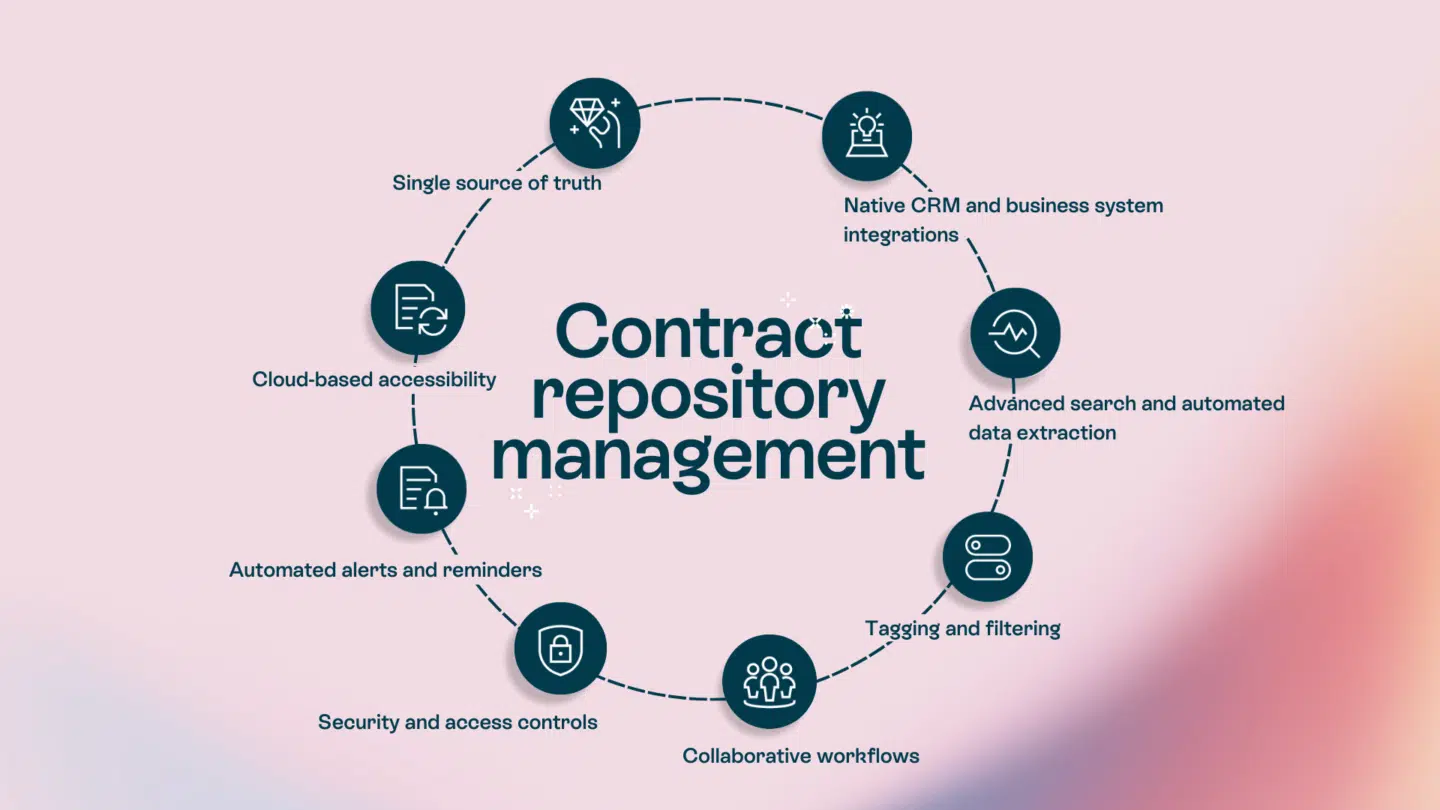Enterprise contract management is full of risks. These risks span all areas of business, ranging from financial penalties like late fees through value leakages such as contract breaches, operational risks, ambiguous commitments and compliance failures.
Modern technology provides an answer to overcome these challenges. Enterprise contract management solutions are transforming the way organizations handle contracts. Not only do they improve security, but also streamline contract creation and centralize the contract lifecycle.
In this article, I’ll talk about the key components of enterprise contract management, discuss its benefits and show a proven software solution that will help you effectively manage contracts across the entire organization and eliminate the risks.
Understanding the basics of enterprise contract management
Before delving into the intricacies of enterprise contract management, let’s first grasp the fundamental concepts and significance behind this discipline.
Enterprise contract management is a critical aspect of modern business operations. It involves the systematic management of digital contracts across an organization to optimize contract processes, improve operational efficiency and minimize legal and financial risks.
Organizations enter numerous contracts with stakeholders, including customers, vendors, partners and employees. Effectively managing these contracts is crucial to ensure compliance, uphold obligations and seize opportunities.

Enterprise contract management systems provide a centralized platform to store, organize and access contracts, making it easier for businesses to monitor contract performance, track milestones and identify potential risks or opportunities. By simplifying and automating the contract management process, enterprise contract management helps enhance productivity, reduce administrative burdens and unlock the hidden value of contracts.
Key components of enterprise contract management
An effective enterprise contract management system comprises several essential components that work in synergy to facilitate efficient contract management:
1. Contract repository: A centralized repository where contracts are securely stored and easily retrievable lets authorized stakeholders access critical contract information anytime, anywhere. The contract repository serves as a secure vault, ensuring that contracts are protected from unauthorized access or loss. It provides a comprehensive view of all contracts, enabling businesses to effectively manage their contractual obligations and commitments.
2. Contract authoring and collaboration: Collaborative functionalities improve communication and ensure all parties are on the same page throughout the contract lifecycle. With contract authoring and collaboration tools, organizations can create contracts using predefined templates, customize clauses and track changes made during negotiations. This promotes transparency, reduces errors and speeds up the contract approval process, eliminating the need for printing, signing and scanning physical documents.
3. Contract performance tracking: The functionality to monitor contract milestones, obligations and key performance indicators (KPIs) ensures that both parties fulfill their contractual commitments. Contract performance tracking enables businesses to stay on top of contract deliverables, deadlines and performance metrics. It provides real-time visibility into contract performance, allowing organizations to take timely actions and mitigate potential risks like missed deadlines and obligations or non-compliance with contractual terms.
4. Reporting and analytics: These capabilities provide insights into contract performance metrics and KPIs that help to identify trends, such as recurring risks or successful strategies. Reporting and analytics tools generate visualizations of contract data, letting businesses analyze it more easily and identify bottlenecks in efficiency, compliance and successful contract execution. By using these insights, organizations can enhance contract management processes, identify areas for improvement and drive better business results.
These key components work together to create a comprehensive enterprise contract management system that enables organizations to effectively manage their contracts, mitigate risks and maximize the value derived from contractual relationships.
Read also: What is enterprise software?

The role of enterprise contract management in business
Streamlining business operations
One of the key benefits of enterprise contract management is its ability to simplify complex contract processes. By automating routine tasks, such as contract creation, approval workflows and document management, enterprise contract management eliminates the need for manual intervention. This not only reduces the chances of human errors but also significantly cuts down on processing time.
Creating an effective contract management dashboard establishes clear audit trails, ensuring that every step of the contract lifecycle is properly documented. This enhances transparency and facilitates easy tracking and retrieval of contract-related information.
Enhancing compliance and reducing risks
Compliance is a top priority for businesses across industries. A modern enterprise contract management system helps organizations systematically manage regulatory compliance and contractual obligations. Through automated alerts and reminders, enterprise contract management software ensures you never miss key contract milestones, such as renewal dates or payment deadlines.
By monitoring contracts and identifying potential risks or non-compliance issues in real time, businesses can take timely actions to address these issues before they escalate. This helps avoid costly legal disputes, safeguards the organization’s reputation and upholds its ethical responsibilities.
Enterprise contract management also gives comprehensive visibility into the contract portfolio. Advanced reporting and analytics capabilities give valuable insights into contract performance, vendor relationships and more.
Different types of enterprise Contract Management Systems
There are two main types of enterprise contract management systems, which we will explore in more detail below.
On-premise systems
On-premise enterprise contract management systems require organizations to host the software and data infrastructure internally. This provides a high level of control and customization but requires substantial upfront investments in hardware, software licenses and IT resources for maintenance and support.
Read also: How digital signatures can strengthen risk management for enterprises
Cloud-based systems
Cloud-based enterprise contract management systems are hosted on remote servers and accessed through web browsers or mobile apps. Users can access and manage contracts from any device with an internet connection, facilitating remote work and global collaboration. Multiple users can work on contracts simultaneously, eliminating the need to print or scan different versions of the same document, which is particularly useful for organizations with global reach. Such tools can scale up or down according to the organization’s needs and integrate with other business systems such as CRM, ERP and procurement tools.
A great example of enterprise contract management software is Oneflow, a tool offering features that simplify and automate the contract lifecycle for large organizations. Here are some of its key features:
- Contract creation: Use dynamic templates to create contracts quickly, with options to add multimedia elements like videos and tables.
- Collaboration: Tools like live editing, interactive fields or comment sections and notifications let teams edit contracts simultaneously, eliminating the need for lengthy email exchanges or printing multiple versions of the same document.
- Signing: Oneflow supports various e-signature methods, including standard electronic signatures, digital signatures, handwritten signatures, SMS verification and electronic IDs.
- Management: Organize contracts in branded workspaces with customizable folders and admin roles.
- Integrations: Connect Oneflow with popular business systems, such as Salesforce, HubSpot and CRM tools to automate workflows and enhance cross-functional collaboration.
- API Customization: Use the buildable API for custom integrations and tailor them to your organisation’s needs.
- Scalability: Oneflow can handle increasing contract volumes as organizations grow, ensuring efficiency and performance.
- Security and compliance: Our tool prioritizes data protection and compliance with regulatory standards, ensuring the security of sensitive information.
- Branded workspaces: Create workspaces that mirror your brand and workflow structure, enhancing user experience and alignment.
Sounds interesting? Try Oneflow today and see how it can benefit your enterprise contract management processes.

Features to look for in an enterprise Contract Management System
Contract lifecycle management
An ideal enterprise contract management system should cover the entire contract lifecycle, from initiation to renewal or termination. It should offer comprehensive contract authoring, negotiation, approval workflows and integration capabilities with other business systems to ensure seamless data flow and process automation.
Integration capabilities
An enterprise contract management system should seamlessly integrate with other critical business systems, such as customer relationship management (CRM), enterprise resource planning (ERP) and business intelligence (BI) tools. This lets you leverage existing data, enhance cross-functional collaboration and gain a holistic view of their operations.
Read also: Enterprise contract negotiation: The essential guide

The future of enterprise contract management
As technology advances at an unprecedented pace, enterprise contract management should also evolve and embrace innovative solutions for contract management.
The impact of artificial intelligence
Artificial intelligence (AI) has the potential to transform enterprise contract management by automating contract analysis, extracting key insights and predicting contractual risks or opportunities. AI-powered contract analytics can enhance compliance monitoring, identify cost-saving opportunities and improve decision-making based on data-driven insights.
Here’s how Oneflow already uses AI to transform contract management:
- Our AI Review tool identifies potential risks and ensures contract compliance,
- AI Insights analyze documents in bulk, providing instant due diligence and compliance reports across entire portfolios,
- Write with AI helps spot errors and improve contract writing. Our technology helps to reduce enterprise contract management risks by spotting overlooked organizational mistakes.
The key takeaways
We know that the smallest oversight in contract compliance or meeting deadlines can lead to significant financial or reputational consequences, adopting an enterprise contract management solution along with best practices helps businesses mitigate these risks.
Oneflow supports effective enterprise contract management, ensuring compliance with legal and regulatory requirements, helping businesses escape the risk of penalties and contract breaches. It uses AI to help users write clear and concise contracts and conduct in-depth analyses. By using Single Sign-on and SCIM API you can integrate it with existing authentication policies, enhancing security and facilitating user management. Users from different locations can collaborate on contracts in real time, simultaneously editing and commenting on the contracts.
Try Oneflow today and see how it can improve your enterprise contract lifecycle management.
FAQs
What is enterprise contract management?
Enterprise contract management involves managing contracts across their full lifecycle, a process essential for large organizations to ensure compliance, efficiency and risk reduction. Regulated industries face unique challenges, including high contract volume and complex regulations requirements, making strong contract management indispensable.
What is SAP enterprise contract management?
SAP Enterprise Contract Management is a solution helping organizations manage their contracts’ lifecycle of their contracts in compliance with legal and regulatory requirements. It’s part of SAP’s broader set of enterprise solutions and integrates seamlessly with other SAP modules such as SAP S/4HANA, SAP Ariba and SAP CLM (Contract Lifecycle Management).
What are the 5 steps of contract management?
Here are the five main steps of contract management:
- Contract initiation
- Identify the need for a contract and outline goals.
- Determine the parties involved.
- Establish primary terms and conditions.
- Contract creation and negotiation
- Produce the first contract document.
- Examine the contract and suggest changes.
- Communicate to reach a mutually beneficial agreement.
- Contract approval
- Ensure compliance with laws and regulations.
- Secure approval from relevant stakeholders.
- Confirm all parties agree on the contract terms.
- Contract execution
- Get signatures from authorized representatives.
- Fulfill contractual obligations.
- Contract administration and monitoring
- Monitor contract performance and compliance.
- Decide whether to renew, modify or terminate the contract.
What is enterprise CLM?
Enterprise Contract Lifecycle Management refers to managing contracts throughout their lifecycle, from creation and negotiation to execution, performance tracking, contract renewal and eventual termination.









